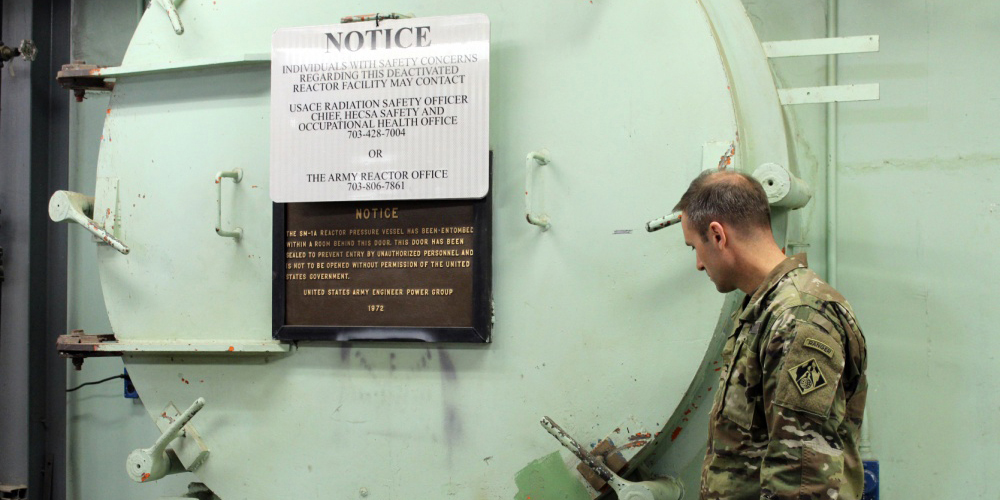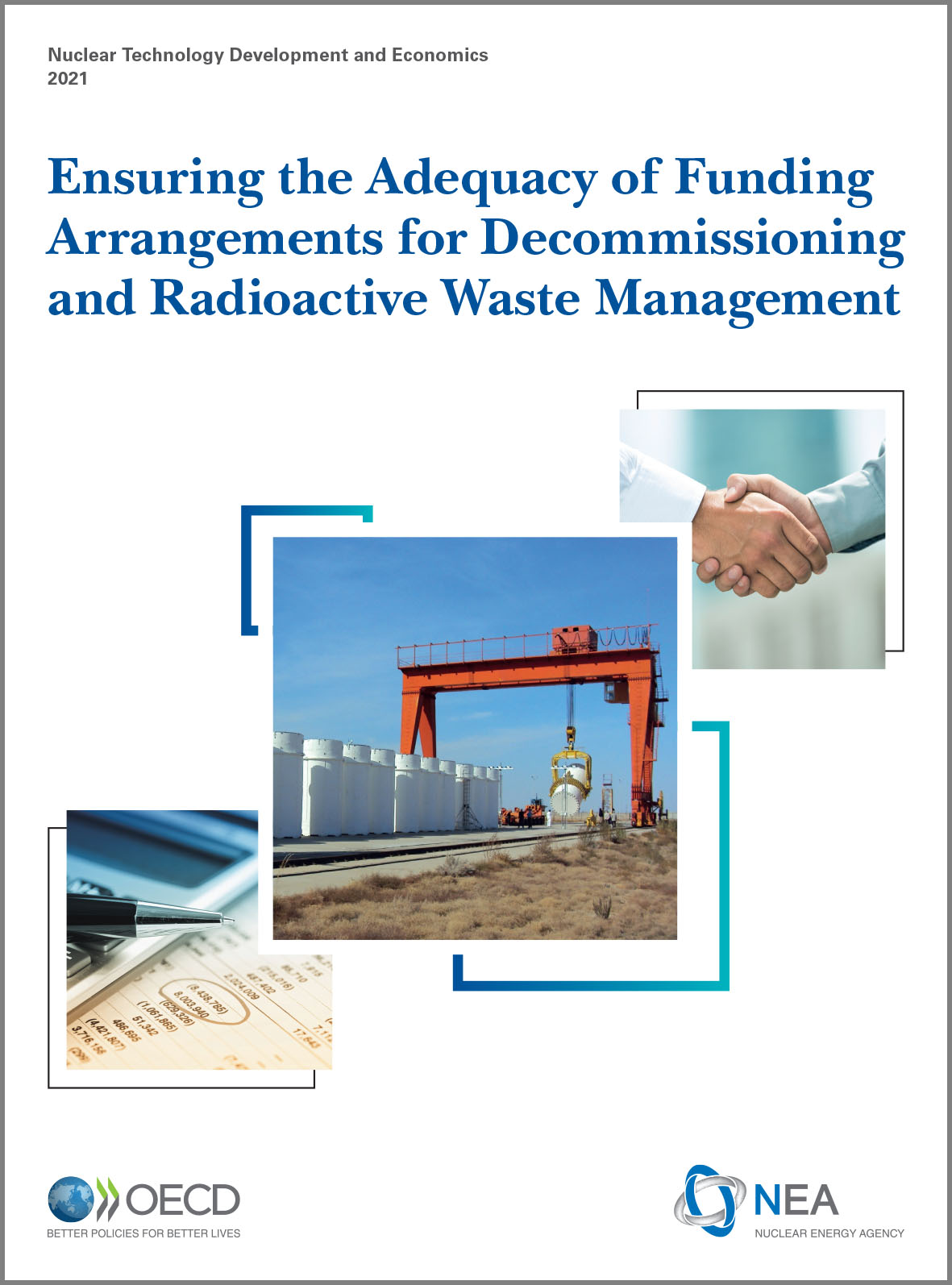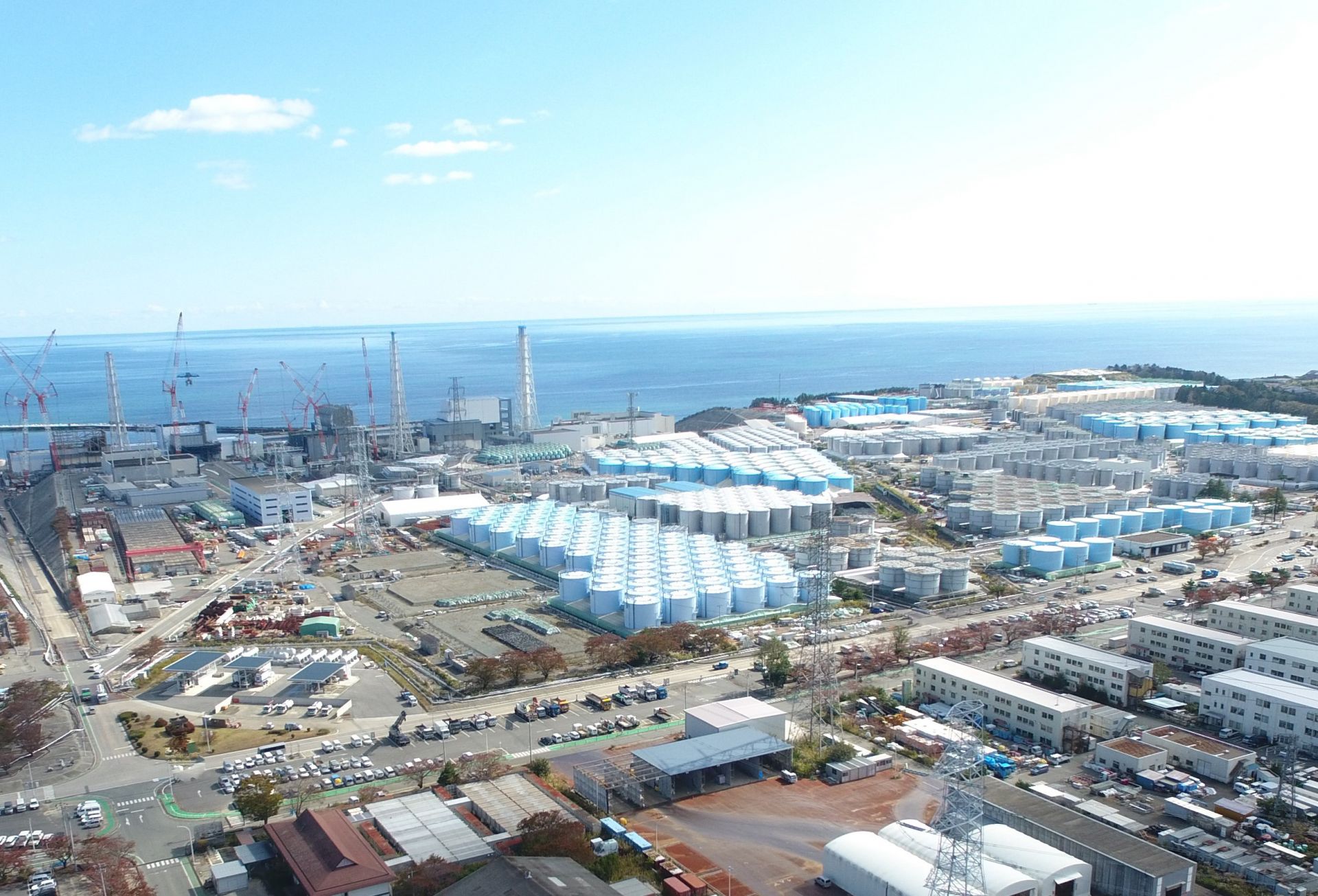NorthStar is challenging the sale of Kewaunee to EnergySolutions. (Photo: Dominion Generation)
NorthStar Group Services is being allowed to intervene in Wisconsin’s regulatory review of the sale of the Kewaunee nuclear power plant by Dominion Energy to EnergySolutions for decommissioning. An administrative law judge granted NorthStar permission on September 7 to participate in the Public Service Commission of Wisconsin’s review of the transaction.
A graphic representation of the tendons encircling the San Onofre containment domes. (Image: SCE)
A nearly yearlong effort to de-tension and remove more than 400 steel cables, known as tendons, from the two containment domes of the San Onofre Nuclear Generating Station (SONGS) was recently completed, with only one minor first aid incident recorded, according to Southern California Edison.
Vattenfall’s Christopher Eckerberg (left) and Aziz Dag of Westinghouse Electric Sweden AB sign the agreement for decommissioning of large radioactive components at Sweden’s Ringhals-1 and -2. (Photo: Vattenfall/John Guthed)
Westinghouse will segment and dispose of the reactor internals and pressure vessels at Sweden’s Ringhals-1 and Ringhals-2 under a deal announced last week with plant owner Vattenfall. Unit 2, a pressurized water reactor, and Unit 1, a boiling water reactor, were shut down in 2019 and 2020, respectively, after operating for more than 40 years.
Col. John Litz, of the USACE Baltimore District, examines the containment vessel door of the SM-1A deactivated nuclear power plant during a site visit in April 2019.
The U.S. Army Corps of Engineers is set to begin decommissioning SM-1A, the mothballed nuclear power reactor at Fort Greely, in Alaska, beginning next year, a project that is expected to take approximately six years. The USACE said it expects to release a request for proposals soliciting contractor bids for the decommissioning and dismantlement project by late summer.
Hunterston B’s pile cap and fueling machine. (Photo: EDF)
The U.K. government and EDF have agreed to improved arrangements for the decommissioning of Britain’s seven advanced gas-cooled reactor nuclear power plants, which are due to reach the end of their operational lives this decade.
A U.S. Navy Surface Ship Support Barge (the large vessel in photo), which is used to refuel nuclear-powered ships and dismantle spent fuel units, will be scrapped in a three-year process. (Photo: Stripes.com)
Towed from its home in Newport News, Va., the U.S. Navy’s Surface Ship Support Barge has arrived in Mobile, Ala., for decommissioning, Advance Local Alabama reported on June 1. The 268-foot-long barge operated from 1964 to 2016, supporting the Navy's nuclear vessel refueling and functioning like a spent fuel pool at a commercial nuclear power plant.
The new sign at the Indian Point Energy Center. (Photo: Holtec)
The transfer of the Indian Point nuclear power plant from Entergy to Holtec International and its subsidiaries was completed last week. Under the asset transfer deal, Holtec Indian Point becomes owner of the closed plant, with Holtec Decommissioning International serving as the site’s license holder and decommissioning operator.
Canada’s pickering nuclear power plant. (photo: opg)
A collaboration agreement signed by Ontario Power Generation’s Center for Canadian Nuclear Sustainability, Canadian Nuclear Laboratories, and SNC-Lavalin will build on Ontario’s extensive nuclear industry expertise and skilled workforce to support the decommissioning of CANDU reactors in Canada and around the world, according to a May 13 press release from the organizations. The work will include the decommissioning of OPG’s Pickering nuclear power plant following the end of commercial operations in 2025.
New York’s Indian Point-3 was scheduled to close in April 2021.
At present, more than 20 commercial nuclear power plants in the United States have entered the decommissioning process, and many indicators point to a coming wave of additional plant closures. Indeed, with increasing numbers of plants terminating operations due to unfavorable market conditions, some voices have deemed this the “age of decommissioning.”
Regardless of whether a plant shuts its doors earlier than anticipated or seeks a life extension through relicensing, all plants eventually close. When they do, the closure sets off a wave of economic impacts ranging from minor disruptions to severe and long-lasting harm.
EnergySolutions will acquire Kewaunee for decommissioning. Photo: Dominion Generation
Utah-based EnergySolutions has entered into a definitive agreement with Dominion Energy to acquire the closed Kewaunee nuclear power plant for prompt decommissioning. Located about 30 miles southeast of Green Bay, Wis., the single-unit, 574-MWe pressurized water reactor was shut down in May 2013 for financial reasons.
The closed Vermont Yankee power plant is currently undergoing decommissioning. (Photo: Entergy)
The Nuclear Regulatory Commission is set to allow about 2 million gallons of low-level radioactive wastewater from the Vermont Yankee nuclear power plant, currently undergoing decommissioning, to be disposed of at an Idaho waste facility. As published in the May 7 Federal Register, the NRC has issued an environmental assessment and finding of no significant impact for a request by NorthStar Nuclear Decommissioning to dispose of the wastewater at US Ecology Idaho’s waste facility near Grand View.
Indian Point nuclear power plant in Buchanan, N.Y.
The State of New York will withdraw its lawsuit against the transfer of Indian Point’s license to Holtec International for decommissioning under a provisional agreement signed on April 14. In exchange, Holtec has agreed to maintain a minimum of $400 million in Indian Point’s decommissioning trust fund for the next 10 years.
A current picture of the Fukushima nuclear power station with the more than 1,000 water storage tanks on site. Photo: Courtesy of TEPCO.
The Japanese government will soon announce the decision to dispose of stockpiled Fukushima wastewater into the Pacific Ocean, according to an AP News story published last Friday. The decision is years in the making and follows the guidelines from a panel of government-appointed experts named the Subcommittee on Handling of the ALPS-Treated Water (ALPS Subcommittee).
The Three Mile Island nuclear generating station in 2010.
A community advisory board has been formed for the decommissioning of Unit 2 of the Three Mile Island nuclear power plant, according to a March 23 report by StateImpact Pennsylvania, a collaboration of National Public Radio member stations. The Nuclear Regulatory Commission approved in December the transfer of TMI-2 and its license to TMI-2 Solutions for decommissioning. TMI-2 Solutions is a subsidiary of EnergySolutions.
According to the report, the TMI-2 Community Advisory Panel (CAP) is made up of 15 people who represent the plant and its neighbors, including townships, school districts, first responders, nuclear planners, and state historians. The group is being led by Londonderry Township manager Steve Letavic.
TMI-2 Solutions said that it will provide quarterly decommissioning updates to the TMI-2 CAP. As a volunteer non-regulatory organization, the CAP will provide community feedback to TMI-2 Solutions, including any issues or concerns related to TMI-2 decommissioning activities.




 and Aziz Dag of Westinghouse Electric Sweden AB.jpg)




 Noting the challenges Japan will face in managing the nuclear waste that will be generated from decommissioning 79 of its nuclear research and development facilities, the International Atomic Energy Agency is recommending that the country prepare for delays in the development of disposal facilities and provide appropriate waste storage capacity for the interim period.
Noting the challenges Japan will face in managing the nuclear waste that will be generated from decommissioning 79 of its nuclear research and development facilities, the International Atomic Energy Agency is recommending that the country prepare for delays in the development of disposal facilities and provide appropriate waste storage capacity for the interim period. A report by the OECD Nuclear Energy Agency proposes a new approach to assessing the financial adequacy for undertaking nuclear decontamination and decommissioning projects and high-level radioactive waste management.
A report by the OECD Nuclear Energy Agency proposes a new approach to assessing the financial adequacy for undertaking nuclear decontamination and decommissioning projects and high-level radioactive waste management.





.jpg)
